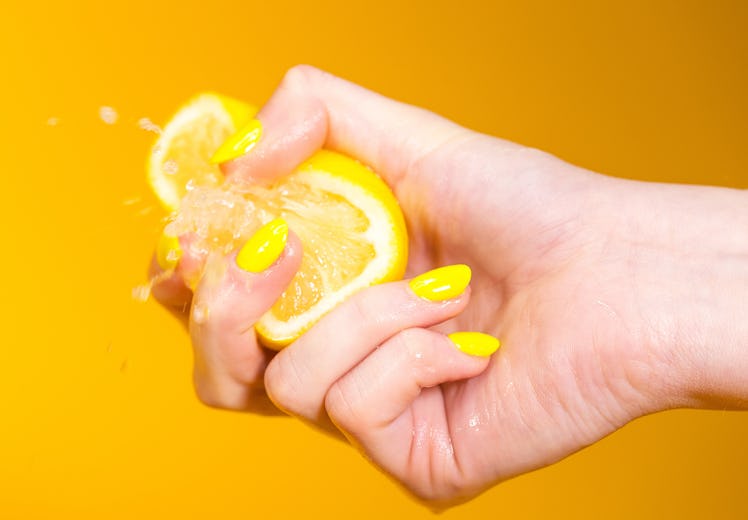
PSA: Squirting During Sex Is Not The Same Thing As Peeing
We promise.
If vaginal ejaculation — commonly referred to as "squirting" — seems like a mystery to you, that's because it kind of is. Not everyone experiences it, and even people who do don’t always understand how or why it happens. Despite any myths you might have heard about vaginal ejaculate being urine, squirting and peeing aren’t exactly the same thing. They’re related, yes, but the specific composition of fluids released during orgasm can vary from person to person. Many people are unclear about whether squirt is the same thing as urine. Confused? Let’s break it down with the help of two experts.
“‘Gushing,’ ‘squirting,' [and] ‘female ejaculation’ are words to describe a true sexual phenomenon,” says Dr. Sherry Ross, women’s health expert and author of She-ology and She-ology, The She-quel. (Non-binary folks and trans men can experience this same type of squirting, too.) “For some women, when they are sexually aroused or stimulated, there is an expulsion of fluid that comes from the glands around a woman’s urethra, or anterior surface of the vagina, during or before an orgasm.” Just as the penis releases semen during orgasm, sometimes the vaginal area “squirts” out liquid during climax.
It’s unclear what causes this and why some people squirt regularly while others never do, but it may have something to do with what exactly gets stimulated during sex. “The exact ‘sweet spot’ is a bit of a mystery, but there are different theories,” Ross explains. “Some believe that squirting happens when your g-spot is stimulated.” The area right around the vaginal opening (close to where the G-spot lies) swells up with blood and fluid during arousal, and as the pelvis contracts with orgasm, sometimes these fluids are released. This can happen even if you've peed before sex.
The liquid typically comes from the Skene’s glands, or paraurethral glands, which lie between the urethra and the vaginal opening. These glands help contribute to vaginal lubrication during sexual activity, but other than that, Dr. Lauren Streicher, Associate Clinical Professor of Obstetrics and Gynecology at The Feinberg School of Medicine, tells Elite Daily they don’t typically do much. (In fact, their specific purpose remains the subject of scientific debate.) “In most people, they’re not very well developed,” Streicher says. “In some women, they tend to be a little bit more developed, and at the time of orgasm, some women do emit fluid from these glands.” This fluid is described in a 2009 Medical Hypotheses study as a “viscous, white secretion” that is “unlike urine” in composition.
But the Skene’s glands are very close to the urethra, and sometimes, urine can get mixed in with ejaculate fluid. “A lot of women will lose a little urine at the time of orgasm, mainly because the pelvis contracts,” Streicher explains, noting that the exact amount of urine released may vary from person to person. “Not every woman, of course, has an ejaculation at the time of orgasm, and with the ones that do, most experts feel that it is probably a combination of both [urine and fluid],” Streicher says. “There are some people who may lose a little bit of urine, and there are some women that may have an emission from the Skene’s glands.”
This quick release of fluids may make the person feel like they're peeing during orgasm. “For some, the gush of squirting feels as though you are wetting the bed, and for others it is less obvious,” Ross tells Elite Daily, noting that the body is more likely to release urine during orgasm if you don't empty your bladder before sex. "Since the bladder sits directly on top of the vagina, the act of a penis or dildo going in and out of the vagina creates the sensation of the urge to pee," Ross explains. "How strong the urge to pee depends on if you emptied your bladder before sex, how long you are engaging in vaginal penetration, and certain sexual positions." So, yes, you can pee during sex, but peeing before sex decreases the likelihood you’ll leak urine.
All this gray area explains why squirting remains somewhat of a scientific controversy. “This is very, very difficult to study,” Streicher notes. “We know that there’s fluid, [and] fluid has been collected that appears to be a very dilute urine, but it’s really hard to know where the fluid is coming from.” She says the most important thing to know is that both situations are normal. “What I try and tell patients is, it really doesn’t matter, unless you’re bothered by it,” she explains. Some people squirt, some don’t, and for the most part, that’s impossible to change. If the fluid you squirt is mostly urine, you can potentially decrease the amount by emptying the bladder before sex or by treating urinary incontinence with a doctor. But in any case, you shouldn’t feel shame about whether or not you squirt — it’s just your body doing its natural thing! It also doesn't necessarily mean your orgasm is stronger, just that your Skene's glands are capable of expelling fluid.
“It’s normal if you do [squirt], and it’s normal if you don’t,” Streicher says. As long as you’re experiencing pleasure, that’s what matters most. And, as always, talk with your doctor about any specific questions you might have if you want to learn more about what’s happening in your body, during sex or otherwise.
Experts cited:
Dr. Sherry Ross, women’s health expert and author of She-ology and She-ology, The She-quel.
Dr. Lauren Streicher, Associate Clinical Professor of Obstetrics and Gynecology at The Feinberg School of Medicine
This article was originally published on